|
|
|
Sort Order |
|
|
|
Items / Page
|
|
|
|
|
|
|
| Srl | Item |
| 1 |
ID:
084399


|
|
|
|
|
| Publication |
2008.
|
| Summary/Abstract |
Democracy as political doctrine has its fair share of controversies over the adjudication of rights and the prioritization of the individual over the community. These debates have largely derived from its western genesis. The current stage of global development has however supplied many non-western perspectives on democracy which suggest that any consensus over an identifiable body of democratic thought is likely to witness more sub-diversity than ever before. This article argues that contemporary Asian thinkers on the philosophy of government have a valuable contribution to make to democratic discourse notwithstanding the clichés of the Asian Values debate of the 1990s. By performing a sampled reading of José Rizal, Sukarno and Lee Kuan Yew on their diverse interpretations of guided democracy in a nationalistic context, it will be shown that these three modern Southeast Asian political thinkers would offer some tentative Asian insights on the democracy of dignity and of responsibility.
|
|
|
|
|
|
|
|
|
|
|
|
|
|
|
|
| 2 |
ID:
140589
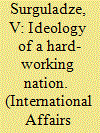

|
|
|
|
|
| Summary/Abstract |
THE GLOBAL ATTENTION to the reforms of the architect of Singapore's "economic miracle" is easily explained by the country's socio-economic successes. Lee Kuan Yew, the first prime minister of Singapore, is an iconic figure in the modern world. In many developing and industrial countries, he is regarded as a true economic and political guru. His book, From Third World to First. The Singapore Story: 1965-2000,1 has deservedly become a handbook for many state leaders.* What kind of a country is Singapore today and why does the experience of this small nation attract the attention of state leaders faced with questions of modernization and successful competition in the global market?
|
|
|
|
|
|
|
|
|
|
|
|
|
|
|
|
| 3 |
ID:
172800


|
|
|
|
|
| Summary/Abstract |
While local Marxist and neo-Marxist parties attempted to synchronize their revolutionary struggles with the centers of world communism during the period 1945–1991, political currents on the ground in Malaysia and Singapore were pushing for the establishment of postcolonial authority, social peace, and economic prosperity. The Cold War struggle between 'communism' and 'democratic capitalism' was highly refracted, even distorted, on the ground in these two Southeast Asian countries. This refraction was largely manifested in the struggles by nationalists of all ideological stripes to achieve a multiracial society through interethnic decolonization under the banner of waging 'class warfare' against colonial authority. For many anti-colonial political parties, siding with or joining leftist movements was a façade for revolutionary agendas that were not necessarily Marxist-Leninist in orientation. Secondly, the biographies and civil society narratives of contending political figures of the time suggest that they were less inclined to define their thinking about development along Cold War ideological orthodoxy than to defy the latter to make things work for prosperity. Finally, the successor elites who took the place of the colonial rulers were consistently obsessed with burnishing sovereignty in spite of the international Cold War. This can be seen in their slippery practice of nonalignment in foreign policy. The Malaysian and Singaporean cases strongly present the thesis of indigenization of the Cold War for local purposes.
|
|
|
|
|
|
|
|
|
|
|
|
|
|
|
|
| 4 |
ID:
144532
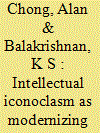

|
|
|
|
|
| Summary/Abstract |
This article attempts to engage in a preliminary twinned study of the foreign policy styles of Mahathir bin Mohamad and Lee Kuan Yew within the framework of ‘modernizing Southeast Asian foreign policies’. Modernization is a process of immense multidimensional displacement in economy, society, political system, attitudes towards politicians, identities, work, and consumption. As such the onus falls upon their leaders to either mitigate change or productively awaken their followers to embrace a new mode of thought. Both Lee and Mahathir have however chosen to engage in the foreign policy of intellectual iconoclasm featuring the narrative of ‘productive shock’, manufactured nationalist logics, elitist policy-making and elaborate self-propaganda.
|
|
|
|
|
|
|
|
|
|
|
|
|
|
|
|
| 5 |
ID:
145662


|
|
|
|
|
| Summary/Abstract |
Ever since Deng Xiaoping’s visit to Singapore in 1978, Beijing has showed tremendous interest in modeling Singapore on various aspects of domestic governance. This article seeks to locate China’s interest in learning from Singapore in the style of governance typified by Lee Kuan Yew, Singapore’s founding father. This article explores the domestic aspects of governance that are common to both countries and seeks to explain China’s interests toward Singapore in as far as it views Singapore as a model of efficient and effective government. This is seen in three key areas, namely, the strength of Singapore’s first-generation political leadership, the stability of the ruling party and consequently the country, and Singapore’s economic growth.
|
|
|
|
|
|
|
|
|
|
|
|
|
|
|
|
| 6 |
ID:
148549
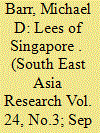

|
|
|
|
|
| Summary/Abstract |
It is no secret that a dynasty has emerged as the ruling force in Singapore. The Lee family (of former Prime Minister Lee Kuan Yew and current Prime Minister Lee Hsien Loong) is referred to as ‘the first family’ as a matter of routine in private conversation, though not usually in public. Power has already passed from father to son and now there is a generation of high-flying grandsons in the wings. This article traces the establishment and consolidation of the Lee dynasty from the point in the early 1980s when Lee Kuan Yew emerged as the centre of all the significant power networks in Singapore, through to the consolidation of power in the hands of his son, Lee Hsien Loong, in 2011. In the process of doing this, it argues that despite official rhetoric that says that the country runs on the talent of the best and most talented men and women in the country, and the closely related myth that professionalism provides the basis of governance, the reality is that of rule by a family-based clique of confidantes and relatives. There is a strong element of reality to both myths, but both elements are ultimately subordinated to and in the service of the forces of consanguineous and personal networks.
|
|
|
|
|
|
|
|
|
|
|
|
|
|
|
|
| 7 |
ID:
173861
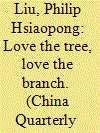

|
|
|
|
|
| Summary/Abstract |
Chinese national identity has long been considered to have been an obstacle to Singapore's nation-building efforts. This is mainly because China was suspected of using its ethnic links to encourage Singapore's communist rebellions during the 1950s and 1960s as Lee Kuan Yew was working towards establishing the city state. This study reviews Lee's exchanges with Beijing and argues that he gave China the impression that he was building an anticolonial, pro-China nation. Beijing therefore responded positively to Lee's requests for support. Reiterating its overseas Chinese policy to Lee, Beijing sided with him against his political rivals and even acquiesced in his suppression of Chinese-speaking “communists.” In addition, China boosted Lee's position against Tunku Abdul Rahman, supported Singapore's independence and lobbied Indonesia to recognize the territory as a separate state. China thus actually played a helpful role in Singapore's nation building.
|
|
|
|
|
|
|
|
|
|
|
|
|
|
|
|
| 8 |
ID:
098396
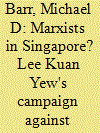

|
|
|
|
|
| Publication |
2010.
|
| Summary/Abstract |
Singapore's ruling elite runs a finely calibrated system of social and political control based on a mixture of monitoring and repression by the state, and self-monitoring and self-restraint by all elements of civil society. This system matured under Goh Chok Tong's premiership in the 1990s but its template was created by Prime Minister Lee Kuan Yew in the final years of his premiership with his handling of a fresh upsurge of social justice activism and dissent that was becoming increasingly brave. In response to these challenges he created a fanciful narrative about a "Marxist conspiracy" to overthrow the state and centered the main force of his allegations on a group of activists who were associated with the local Catholic Church. He accused them of being Marxists who had been subverted by the teachings of liberation theology and used the Internal Security Act to detain them and destroy their rather modest and innocent operations; their treatment provided both an exemplar to other groups and a model for the next generation of the ruling elite to follow. This article uses archival, oral, and secondary sources to build an account of these events with a particular focus on the motivations and activities of this group of Catholics and the motivations of the government-which essentially means the motivations of Lee Kuan Yew.
|
|
|
|
|
|
|
|
|
|
|
|
|
|
|
|
| 9 |
ID:
152259


|
|
|
|
|
| Summary/Abstract |
Singapore entered 2016 with post–Lee Kuan Yew era political stability but buffeted by external headwinds that severely dampened its economic growth performance. Ever forward-looking, the island nation planned for its future political succession and its economic future to take advantage of opportunities that will emerge with the new world and regional economic order.
|
|
|
|
|
|
|
|
|
|
|
|
|
|
|
|
| 10 |
ID:
072995


|
|
|
|
|
| Publication |
2006.
|
| Summary/Abstract |
This article aims to uncover the nuances of Singaporean foreign policy's theoretical contributions to a local variant of realism in international relations, as sourced from the thoughts and discourse of the Republic's elite foreign policy-makers. Previously, pinioning Singapore within classical realism has meant that questions of hegemonic socialization of ideas have been ignored in analysing its foreign policy. It behoves the scholar to pose questions to ideological verities of policy doctrines: From where did it originate? What are its tenets? How is it chosen over other alternatives? The conclusion however hopes to reveal that in terms of discourse ‘Singaporean realism’ is less completely faithful to classical realist precepts than is originally believed by pre-existing scholarship. The theorizing of Singaporean foreign policy is likely to be reconciled in terms of an oxymoron such as ‘practical idealism’ and ‘weak state, soft power’.
|
|
|
|
|
|
|
|
|
|
|
|
|
|
|
|
| 11 |
ID:
129123


|
|
|
|
|
|
|
|